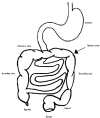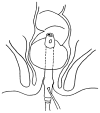Neurogenic bowel management after spinal cord injury: a systematic review of the evidence
- PMID: 20212501
- PMCID: PMC3118252
- DOI: 10.1038/sc.2010.14
Neurogenic bowel management after spinal cord injury: a systematic review of the evidence
Abstract
Study design: Randomized-controlled trials (RCTs), prospective cohort, case-control, pre-post studies, and case reports that assessed pharmacological and non-pharmacological intervention for the management of the neurogenic bowel after spinal cord injury (SCI) were included.
Objective: To systematically review the evidence for the management of neurogenic bowel in individuals with SCI.
Setting: Literature searches were conducted for relevant articles, as well as practice guidelines, using numerous electronic databases. Manual searches of retrieved articles from 1950 to July 2009 were also conducted to identify literature.
Methods: Two independent reviewers evaluated each study's quality, using Physiotherapy Evidence Database scale for RCTs and Downs and Black scale for all other studies. The results were tabulated and levels of evidence assigned.
Results: A total of 2956 studies were found as a result of the literature search. On review of the titles and abstracts, 57 studies met the inclusion criteria. Multifaceted programs are the first approach to neurogenic bowel and are supported by lower levels of evidence. Of the non-pharmacological (conservative and non-surgical) interventions, transanal irrigation is a promising treatment to reduce constipation and fecal incontinence. When conservative management is not effective, pharmacological interventions (for example prokinetic agents) are supported by strong evidence for the treatment of chronic constipation. When conservative and pharmacological treatments are not effective, surgical interventions may be considered and are supported by lower levels of evidence in reducing complications.
Conclusions: Often, more than one procedure is necessary to develop an effective bowel routine. Evidence is low for non-pharmacological approaches and high for pharmacological interventions.
Figures



References
-
- Lynch AC, Antony A, Dobbs BR, Frizelle FA. Bowel dysfunction following spinal cord injury. Spinal Cord. 2001;39(4):193–203. - PubMed
-
- Coggrave M, Norton C, Wilson-Barnett J. Management of neurogenic bowel dysfunction in the community after spinal cord injury: a postal survey in the United Kingdom. Spinal Cord. 2009;47:323–30. - PubMed
-
- Stone JM, Nino-Marcia M, Wolfe VA, Perkash I. Chronic gastrointestinal problems in spinal cord injury patients: a prospective analysis. Am J Gastroenterol. 1990a;85:1114–9. - PubMed
-
- Han TR, Kim JH, Kwon BS. Chronic gastrointestinal problems and bowel dysfunction in patients with spinal cord injury. Spinal Cord. 1998;36(7):485–490. - PubMed
-
- Glickman S, Kamm MA. Bowel dysfunction in spinal-cord-injury patients. Lancet. 1996;347(9016):1651–3. - PubMed
Publication types
MeSH terms
Grants and funding
LinkOut - more resources
Full Text Sources
Medical
Miscellaneous

